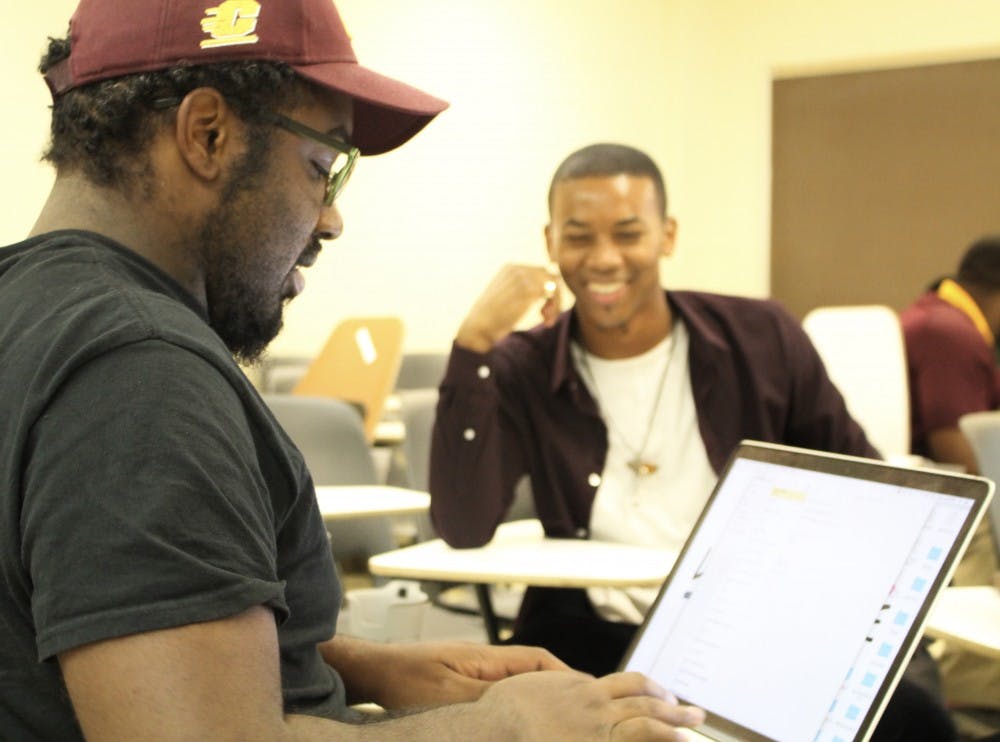Students express themselves, build community through rising hip-hop scene

Detroit junior Daryl Wallace and Brighton senior Aaron Johnson type lyrics during a Justus League meeting on Sept. 11 in Moore Hall.
Hip-hop artist Tim Crosby, originally from Muskegon, didn’t know about the music scene at Central Michigan University until he started getting involved in it. Now, Crosby, whose stage name is Top Notch, says the local hip-hop scene is like nothing he’s seen at other college campuses.
Groups like Justus League, a registered student organization, and CMU Hip-Hop, a non-RSO that started as a Twitter page called @CMU_HIPHop and has grown into a platform for artists to gain exposure, collaborate and release compilation tapes, have worked to unite the hip-hop artists on campus and provide platforms for them to showcase their work.
“There’s not just people rapping at CMU,” Crosby said. “There are people doing videos. There are rappers performing. There are rappers with bands. We all sound different. We’re all creating music in our own style and want to create with each other and grow with each other.”
People might not see Mount Pleasant as a creative town, he said, but there are opportunities everywhere.
“People forget that you’re on a campus of 20,000 people,” Crosby said. “Sure, we’re in the middle of nowhere, but where would you rather be?”
Detroit junior Daryl Wallace is involved in Justus League and CMU Hip-Hop and is also a hip-hop artist.
He complied and organized tracks for a CMU Hip-Hop mixtape called "We Up Next pt. 2 Deluxe Edition," which was released in August. The mixtape features work by 19 artists, including commercials from DJs, and is available on Spotify, Apple Music, Tidal and Audiomack. The project was first released in July, but after more artists expressed interest in being on the tape, a second version was released with additional songs.
Wallace said it’s a party mixtape that gives people something new to listen to as an alternative to mainstream songs.
“You go anywhere on campus or anywhere off campus to any party and you’re going to hear some hip-hop played eventually,” Wallace said. “We’re doing this because eventually we want our campus to know about the hip-hop we bring to the table. They don’t have to just keep listening to the same songs at every party.”
Devon Haggard, whose hip-hop name is Fli City Devo, said the local hip-hop scene is rising and has great potential. When he first started making music a year ago, he easily got connected on campus through Justus League.
“It’s almost the perfect environment (for promoting music) because there are so many people and so many minds,” Haggard said. “You might be surprised by who likes what, or you might spark the interest of someone who didn’t like it before.”
For Haggard, who is from Flint, music is therapeutic and poetic. Though some aspects of his songs might seem negative, he said, they’re real and honest.
The hip-hop community at CMU is diverse, Haggard said, and he hopes more students listen to it and show support at upcoming events.
Though there is a lot happening in the music scene, many students haven’t heard the music released by local artists, Crosby said. He focuses on making personal connections to promote his music because he thinks it leaves a lasting impression.
He likes to make club music that puts people in a good mood and focuses putting on a show for people at performances.
When he goes out, he sometimes has people pull up one of his songs on their phones and talks to them. After making the connection, he’ll add them on social media.
Detroit senior Ahsha Davis, president of Justus League, said this year the RSO plans to focus on talking about hip-hop but also showing people on campus what the organization does.
Many of the organization’s events this year will also focus on philanthropy, such as raising money for survivors of Hurricanes Harvey and Irma. The members of the group want to show support for various communities, such as Black Lives Matter and the LGBTQ community, and show that they’re there for everyone.
“A lot of these issues are in hip-hop music,” Davis said. “It’s talked about in different ways so we want to use that as a tool to be an advocate for those different communities, especially with Black Lives Matter. A lot of hip-hop artists are of African American descent and they face things like that all the time. We want to make sure we understand what’s going on in our community.
“These issues are the reasons we put this in our music, why we talk about it, why we write about it — because no one else is hearing our voices and the best way to really be vocal and get it out to people is through music and poetry."
Music allows people to express themselves, and for artists on campus, their music is their personal story, she said.
“That’s why we strive to let people hear the work that our artists do: so that they have a chance to see their vision and their story,” Davis said.
Wallace said the strongest thing about the hip-hop scene at CMU is how united the artists are. Artists give each other shout outs, collaborate and help each other. Justus League members have grown close and spend time together outside of meetings and events.
“If you come to a meeting, you might walk into a huge jam session,” Davis said.



